
If you would prefer a printed softbound version of When Vegans (Almost) Rule the World, you can pick one up for just $11.99 at Amazon. Kindle eBook coming soon!
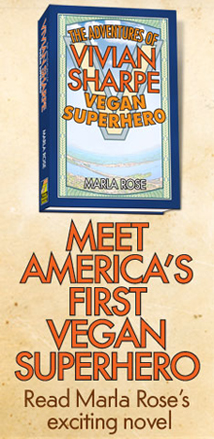
Available in either softbound or Kindle/Nook/etc. eBook at Amazon
viviansharpe.com

 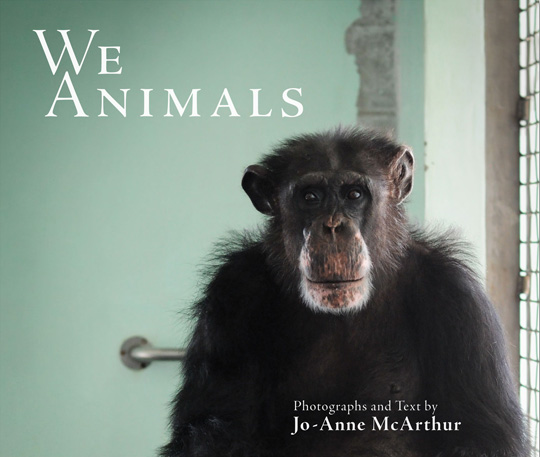 Book Review: We Animals by Jo-Anne McArthur I’m a word person. Language has always been a friend to me, a way to describe, make sense of, enhance and escape this experience, offering something exquisite found nowhere else to me. I have also found enormous comfort in the words of others. Some of my earliest, happiest memories were wandering around the stacks at the Wilmette Public Library when I was a child, gathering, carefully piling and clutching as many books as I could hold into my chest and hoping beyond hope that I made it to the check-out desk without spilling them everywhere. From favorite books that I withdrew again and again to new ones, fresh with a whole new world bursting inside it, the words within helped me to find myself in a place that was often confusing and lonely. The words helped me to understand, get lost and to figure out who I wanted to become. Growing up and now as an adult, written communication has been my preferred tool for reaching others, but words are not everything. They cannot always dismantle the walls people put up. For that, we need every decent tool in our toolbox. What do we do when we are aware of so much that is usually ignored by society? Our unique experience as advocates makes us not only painfully aware of the circumstances animals live in but also often unable to effectively communicate it to those we need to reach in order to create change. The animals, billions of them, languish in metal cages and fetid factories, shallow pools and loud performance stages, and they are not only ignored, but also often overtly exploited, abused and fatally violated. The words we use to describe the reality animals inhabit are often mocked, undermined and silenced because in these words, whether it is spoken or remains unspoken, most people understand that they are complicit due to the habits and privileges that they want to maintain. Because of this - and our inability to get people to address what is clearly obvious and, frankly, appalling - we are often left speechless. How can they not hear us? 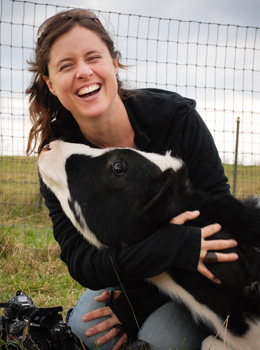 How
do those of us who are awake to the war on animals successfully subvert
status quo when there is so much resistance no matter how gentle or
assertive our approach? We can speak out. We can act up. We can
educate. How do we break down the barriers, though? There is no one
answer, but I think we need to operate at our very best, using our
skills and talents to penetrate where others have not. This is what
photojournalist Jo-Anne McArthur
is doing through her work. She has traveled the globe for more than ten
years, bearing witness to the shockingly ordinary atrocities we inflict
upon other animals in the dark, hidden corners and also in the cold
light of day, and it is presented in her powerful new collection
published by Lantern Books, We Animals.
She bears witness with her quiet grace, her camera and her unflinching
eye for emotionally resonant details; in doing so, viewers are
compelled to confront our own discomfort with business as usual and ask
difficult questions of our own values. These are not photos aimed at
shocking and disturbing, though shock and disturb they likely will.
They are a lens into realms we rarely see and these shots are framed
with Jo-Anne’s beautifully sensitive and aware consciousness, bringing
us the sort of photographs that result when an artist and an activist
collide within one person. Further, using words, Jo-Anne describes what
she has seen and what is outside of the frame, among those she has
documented and those who remain out of sight, fleshing out the photos
further. The cultural blinders are massive and they are constructed by
us (often unknowingly), reinforced by the institutions that will do
everything to prevent us from looking, but Jo-Anne is trying to help us
see. How
do those of us who are awake to the war on animals successfully subvert
status quo when there is so much resistance no matter how gentle or
assertive our approach? We can speak out. We can act up. We can
educate. How do we break down the barriers, though? There is no one
answer, but I think we need to operate at our very best, using our
skills and talents to penetrate where others have not. This is what
photojournalist Jo-Anne McArthur
is doing through her work. She has traveled the globe for more than ten
years, bearing witness to the shockingly ordinary atrocities we inflict
upon other animals in the dark, hidden corners and also in the cold
light of day, and it is presented in her powerful new collection
published by Lantern Books, We Animals.
She bears witness with her quiet grace, her camera and her unflinching
eye for emotionally resonant details; in doing so, viewers are
compelled to confront our own discomfort with business as usual and ask
difficult questions of our own values. These are not photos aimed at
shocking and disturbing, though shock and disturb they likely will.
They are a lens into realms we rarely see and these shots are framed
with Jo-Anne’s beautifully sensitive and aware consciousness, bringing
us the sort of photographs that result when an artist and an activist
collide within one person. Further, using words, Jo-Anne describes what
she has seen and what is outside of the frame, among those she has
documented and those who remain out of sight, fleshing out the photos
further. The cultural blinders are massive and they are constructed by
us (often unknowingly), reinforced by the institutions that will do
everything to prevent us from looking, but Jo-Anne is trying to help us
see. 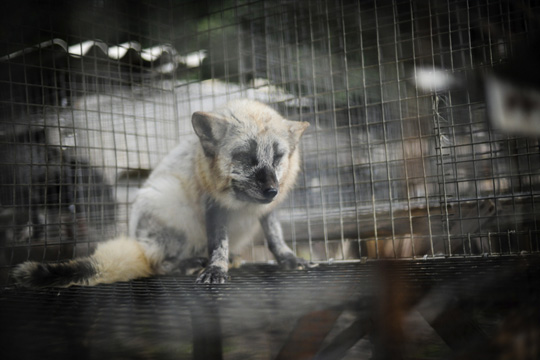 A stirring, difficult and emotionally gripping collection, We Animals bears witness on the front lines of the worst and the best of humanity, and along the way, we become witnesses, too. Not gaping voyeurs, not impassive spectators but witnesses ourselves to brutality, to despair and to triumph as well. Divided into chapters titled Fashion and Entertainment, Food, Research, Mercy and Notes from the Field, We Animals looks into cages and sheds, trucks and sanctuaries, and along the way, we are urged to look, to see, to awaken, to care. As she writes in her introduction, “I
don’t want simply to take pretty pictures of charismatic megafauna and
cute baby animals in the hopes that viewers will feel warm and fuzzy
and thereby care about their welfare. The images must provide the
viewer with the opportunity to gain insight. They should draw the
viewer in and let her linger on what she sees, to feel disturbed or
intrigued in a way that would compel her gaze ultimately to turn
inward, where questions and changes begin.”
Creating change can be painful, though. The photos and stories, of course, are an emotional experience. From nameless minks clustered in a cage around their dead mother on a Swedish fur farm to Ron, the chimp whose body was violated in brutal laboratory experiments but whose gentle spirit shined through (and to whom the book was dedicated), to a close up of pig’s eye on a transport truck, it is hard to not be moved. With page after page, we gasp, turn away, return, cry, and at the end, when some fortunate animals have found freedom and sanctuary, we smile. The experience of We Animals helps us to see again in that unfiltered, unguarded way we did as children. It is not the worst thing in the world to feel emotions; it is far worse to turn ourselves off, to stop feeling, caring and taking action. We may not like all that we see in this collection and that is a good thing because there is a lot to not like. We get to the light, though, to the sanctuaries and car rides to freedom, after we have faced our demons. This book offers viewers the opportunity to break down our blinders: looking, seeing, acknowledging, changing. Wringing our hands won’t do a damn thing. We Animals helps us to face the truth and move forward to alignment with our true convictions about compassion and justice. But first we need to see. I highly recommend We Animals by Jo-Anne McArthur. It is a lens into a time I have every hope whose cruel, unnecessary practices will soon become a thing of the past. Please support Jo-Anne’s vital work through buying this book, and please also look into the amazing documentary about her life documenting these unseen corners of life, The Ghosts in Our Machine. 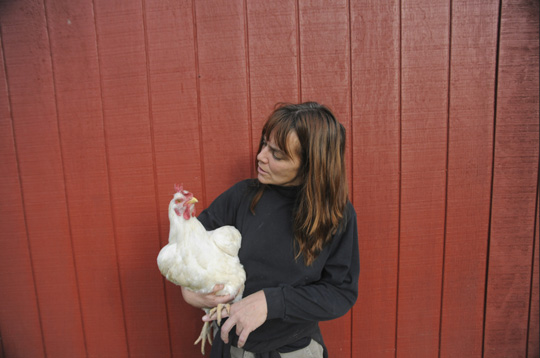 “Spending
sixty seconds looking into just one cage in these facilities feels like
an eternity — as though not only an entire life was contained in that
one minute, but that existence was an endless loop of chicken after
chicken after chicken, pumping out egg after egg after egg, eating the
same, unvaried diet of protein-rich corn and soy meal: every minute of
every hour of every day of every year until they’re no use to the
farmer anymore and they’re killed.”
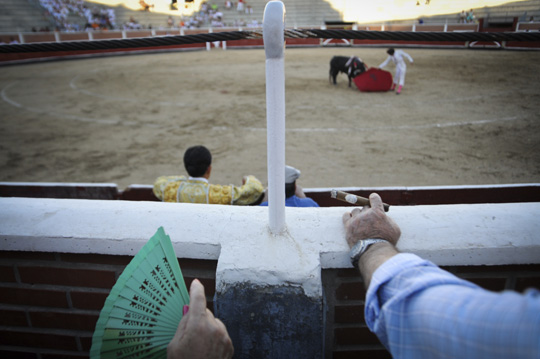 all photos: ©Jo-Anne McArthur © 2013, 2014, Vegan Street |













 |
 |
 |
 |
 |
 |
 |